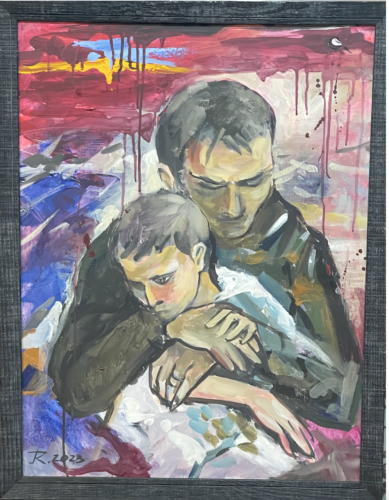In the foreword to the new edition of Falling Upward, researcher Brené Brown shares her sense of spiritual homesickness.
The word “homesick” often conjures up images of a child’s fleeting sadness or their temporary yearning for home and family. In today’s culture, the emotion is often dismissed … [as] a fuzzy overnight-camp feeling, not a fierce emotional experience that is key to the human experience and central to our hardwired need for a sense of place and belonging…. I am drawn to exploring the contours of homesickness to better understand why I can’t shake this unyielding longing for a home that exists only inside me.
Brown shares her regular longing for the home of her own soul:
Spiritual homesickness has been a constant in my life. It was not an everyday experience, but a predictable and always reoccurring desperation to find a sense of sacredness within me, not outside of me: my soul, my home, God in me. It was homesickness for a place that exists only inside me.
Through my thirties and forties, I would occasionally succumb to the yearning, drop everything, and run as fast as I could to visit the home within me. The door to my internal spiritual home would be one simple experience, one encounter with a thin place—maybe sitting in my car listening to Loretta Lynn sing “How Great Thou Art,” or an afternoon swim with God in Lake Travis, or one night praying the Daily Examen. But then, after that visit, I would leave and go back to my first-half-of-life world. I’d describe this first-half-of-life spirituality as the ebb and flow of [the Greek words] nostos and alga, homecoming and pain.
Over the past two years, I’ve found that I’m more spiritually homesick than not. Spiritual homesickness has become an almost daily dulling grief. It’s not depression or exhaustion. It’s an uncomfortable knowing that I’m coming to the end of one thing and the beginning of the next. I’m leaving and arriving. There’s fear, but there’s also joyful anticipation.
Today, when I return home to the place in me where God dwells, I’m no longer interested in making it a quick visit so I can run back to the world of “what other people think” and “what I can get done.” Today, I can barely be dragged out of the house. I’m drawn to different conversations and deeper connections. I want this sacred space to be my home, not somewhere I visit to buttress my “real life” that’s on the outside of my connection with God. I’m starting to wonder if my alga, my pain, is fueled by my separation from God and from my True Self.…
Leaving the first half of life is scary. Most of us have the first-half-of-life hustle down. The thing is, I’m just never, ever homesick for the first half of my life when I walk away from it…. Maybe I’m not homesick for the first half of life because it’s really never been my true home.
| Unseen Patterns of Obedience |
Downton Abbey is not unlike Jesus’ parable about houses and foundations at the end of the Sermon on the Mount. He emphasizes that it is the unseen, buried part of the house that determines its strength. The house can endure storms and floods because of its foundation, not because of its glamorous qualities above the surface. Recent studies say that increasing numbers of Christians, particularly young adults, are falling away from the faith. I wonder if part of the problem is a church culture in America that’s more focused on building impressive houses rather than strong foundations? Life upstairs is easy and often fun. This is the life of exciting church events and activities. It’s thousands gathered for a concert or the dynamic preaching of a gifted speaker. Life downstairs is much more difficult and rarely praised. It’s the life of prayer, solitude, confession, and discipline; it’s where the house is truly maintained.To persevere in the Christian life we must be willing to spend time in the servants’ quarters and cellars and there establish the unseen, and uncelebrated, patterns of obedience. Perhaps the house of American Christianity is falling because we’ve put all of our energy into building what is visible, rather than into what is invisible. DAILY SCRIPTURE MATTHEW 7:24-27 JEREMIAH 17:7-8 EPHESIANS 3:14-19 WEEKLY PRAYERFrom Charles Kingsley (1819 – 1875 )Lift up our hearts, O Christ, above the false shows of things, above laziness and fear, above selfishness and covetousness, above whim and fashion, up to the everlasting Truth that you are; that we may live joyfully and freely, in the faith that you are our King and Savior, our Example and our Judge, and that, so long as we are loyal to you, all will ultimately be well. Amen. |



 Click Image for John White's Original Vision For CO2's
Click Image for John White's Original Vision For CO2's
